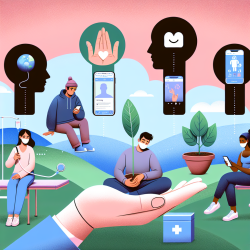Introduction
In the realm of mental health, the transition from adolescence to adulthood is a critical period. With 70% of mental health conditions manifesting during this phase, it is imperative to address the mental health needs of postsecondary students. A recent study, "Effects of a Mobile and Web App (Thought Spot) on Mental Health Help-Seeking Among College and University Students: Randomized Controlled Trial," sheds light on the potential of mobile health (mHealth) interventions in facilitating help-seeking behaviors among students.
Study Overview
The study employed a two-armed randomized controlled trial (RCT) involving 481 students from three Canadian postsecondary institutions. Participants were divided into two groups: one received a mental health services information pamphlet, while the other was given access to the Thought Spot app. This app, developed through participatory design research, allows users to find and share mental health resources, track their mood, and contribute to a crowdsourced database of services.
Key Findings
The primary outcome measured was the change in formal help-seeking intentions over six months. Interestingly, both the intervention and control groups showed similar increases in these intentions, indicating that merely prompting students about mental health can enhance help-seeking behaviors. However, the study found no significant difference between the two groups in terms of formal help-seeking intentions.
Secondary outcomes revealed some promising insights. While there was no significant difference in help-seeking from informal sources, the intervention group showed a slight increase in informal help-seeking behaviors between three and six months. This suggests that mHealth tools like Thought Spot might play a role in converting intentions into actions, particularly in informal settings.
Implications for Practitioners
For practitioners, these findings highlight the potential of mHealth interventions as a complementary tool in mental health strategies. While traditional methods like information pamphlets remain effective, integrating digital solutions can provide additional avenues for students to seek help. Practitioners are encouraged to explore and incorporate such technologies into their practice, considering the unique preferences and needs of their student populations.
Moreover, the study underscores the importance of user engagement. The per-protocol analysis indicated that students who engaged more frequently with the app showed greater improvements in help-seeking intentions. This suggests that sustained engagement with digital tools can enhance their effectiveness, a critical consideration for practitioners aiming to implement mHealth solutions.
Future Directions
While the study provides valuable insights, it also raises questions about the long-term efficacy and cost-effectiveness of mHealth interventions. Future research should focus on these aspects, as well as strategies to improve user engagement and address potential barriers to accessing digital tools. Additionally, exploring the impact of such interventions on diverse student populations, including international students, can offer a more comprehensive understanding of their utility.
Conclusion
The study on Thought Spot offers a glimpse into the potential of mHealth interventions in supporting mental health help-seeking among postsecondary students. As the field of digital health continues to evolve, practitioners have an opportunity to harness these tools to enhance their practice and better meet the needs of their clients.
To read the original research paper, please follow this link: Effects of a Mobile and Web App (Thought Spot) on Mental Health Help-Seeking Among College and University Students: Randomized Controlled Trial.










